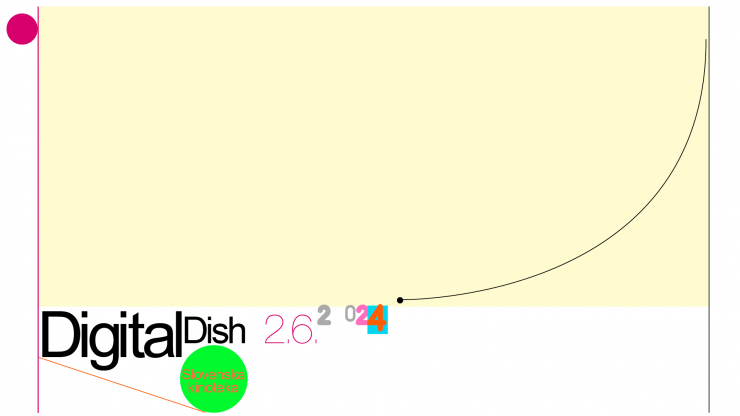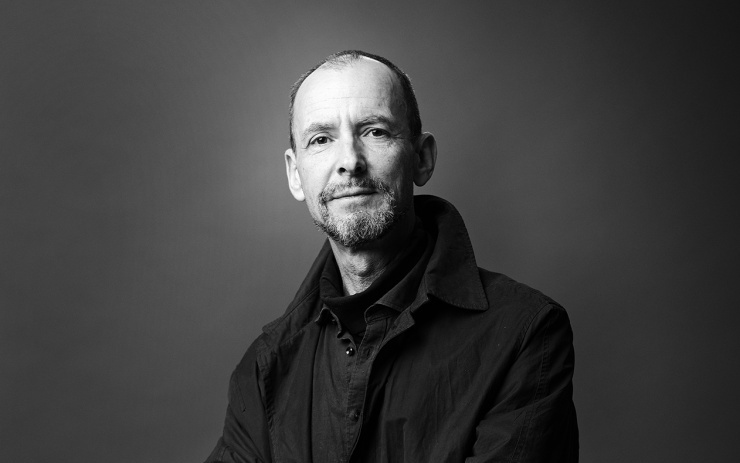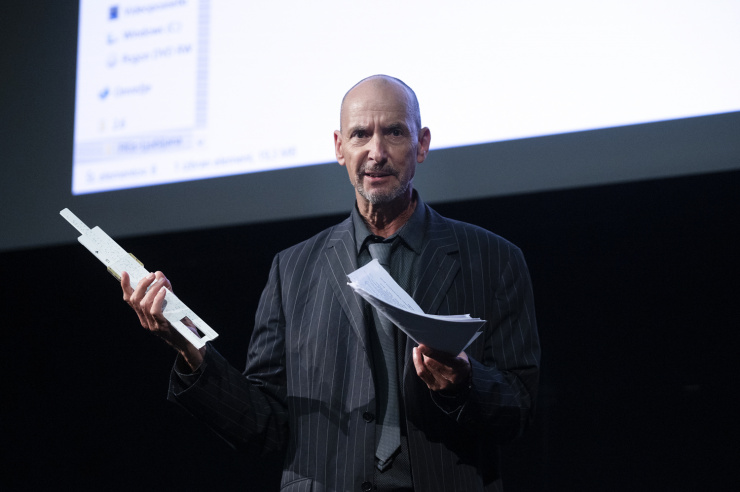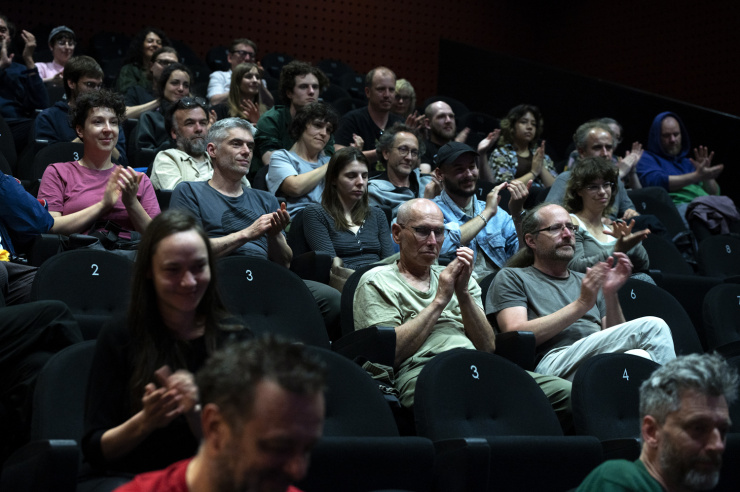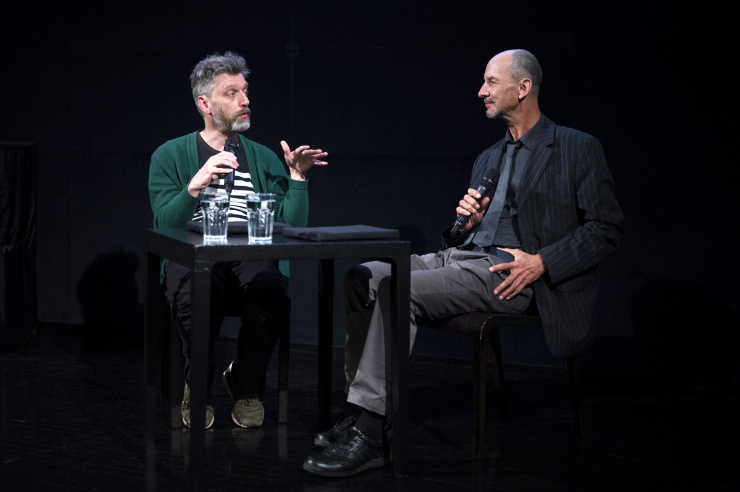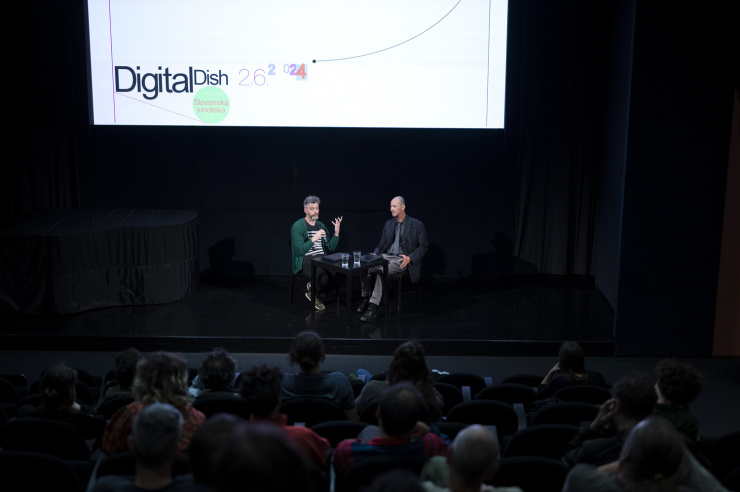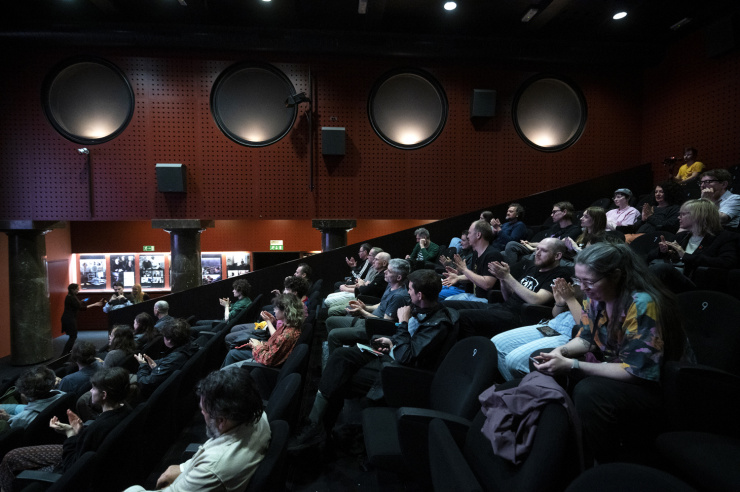Adela: Digital Dish
DATE: Sunday, 2 June 2024 | 17:00-19:30
LOKACIJA: Slovenian Cinematheque
Free Entry. Free tickets available at the Slovenian Cinematheque box office.
This year’s Digital Dish offers an in-depth exploration of the central themes of Adela Festival 2024 while broadening horizons with other media and presentation formats. In the company of two brilliant media archaeologists, Wolfgang Ernst and Joost Rekveld, we’ll reflect on what we can learn from dialogues with machines and explorations into the history of computing, why there is no such thing as dead media, and what creative potential technology has.
We’ll screen Rekveld’s latest abstract sci-fi animation, a meditation on material processes and time and a speculation on what technology might be doing without people. Ernst’s lecture on the beginnings of generative art and information aesthetics through experimentation with analogue devices also draws on Rekveld’s film. As one of the founders of the field of media archaeology, Ernst will show the relevance of analogue computing through a view into history and will then discuss the authenticity and sustainability of this medium with the filmmaker.
Digital Dish is part of the International Festival of Generative Arts Adela.
About the film
Joost Rekveld: Mechanisms Common to Disparate Phenomena, #59 (Belgium, 2023, 79 min., DCP)
Simultaneous with the construction of the first planetary surveillance systems in the Cold War, a Japanese scientist encounters chaotic equations when working on his analogue computer … Humans, aliens and devices vacillate between electronic liveliness and dreams of control in this scintillating, abstract animated film. #59 is an attempt to liberate our computing technologies from their problematic origins by giving a voice to the creative powers that reside inside them.
All images in the film were produced as analogue electronic signals in a re-enactment of antiquated computing methods. These signals were generated using period equipment, including an analogue computer from 1963, early sonar and radar oscillators, and bits from military flight simulators. Rekveld’s film is his attempt to liberate these technologies from their problematic origins.
Narrative elements derived from Cold War-era science fiction films set the tone, while references to radar and television scanning result in images that evoke very early computer graphics. These progressively unfold into organic calligraphies, in which the negative space between the patterns becomes one of the protagonists. Resemblances with manmade phenomena are gradually left behind, and the film evolves into a nonverbal meditation on material processes and the arrow of time. What would circuits do without people?
About the lecture
Wolfgang Ernst: There is No Dead Media. On the Actuality of Analogue Computing
Generative art and informational aesthetics are frequently associated with computer-generated, algorithmic imaging. But neither computer games nor computer graphics started with digital computing. They rather derive from experimentation with analogue devices and mechanical plotters or oscillographic monitors as their visual interface – as practised by heroes of media art. Nowadays, it is being rediscovered in artistic media archaeology, such as Rekveld’s recent film Mechanisms Common to Disparate Phenomena, #59.
In terms of the history of technology and media aesthetics, the analogue computer seems like a “dead medium” (Sterling) that has long been replaced by digital computing. An even more “radical” media archaeology, though, reveals the analogue computer not as a simple predecessor but as a genuine and enduring, ahistorical alternative to digital computing – just like its technical twin, the modular electroacoustic music synthesizer. The “undead” analogue computer returns in the related principles of quantum computing, “unconventional computing” and artificial neural nets for AI and “Deep” Machine Learning. Even more fundamentally, a critique of “digitalisation” arises from the re(con)naissance of the analogue paradigm concerning concepts like order, “chaotic” disorder and the nonlinearity of the microverse.
Gallery
About the authors
Joost Rekveld is an artist who wonders what humans can learn from a dialogue with the machines they have constructed. In the form of media archaeology, he investigates modes of material engagement with devices from forgotten corners in the history of science and technology. The outcomes of these investigations often take the shape of abstract films that function like alien phenomenologies. In their sensuality, they are an attempt to reach an intimate and embodied understanding of our technological world. His abstract films have been shown worldwide in a broad range of festivals and venues for experimental film, animation or other kinds of moving images. He has had retrospectives at the Barbican in London and the Ann Arbor Film Festival, amongst others. In 2017, he was a filmmaker in focus at the International Film Festival Rotterdam.
Wolfgang Ernst, PhD, is a full professor of media theories at the Institute for Musicology and Media Science at Humboldt University in Berlin. Academically trained as a historian and classicist (Latin Philology and Classical Archaeology) with an ongoing interest in cultural temporalities, Ernst grew into the emergent technology-oriented “German school” of media science. His academic focus has been on archival theory and museology before attending to media materialities. His current research covers “radical” media archaeology as a method, the epistemology of technológos, the theory of technical storage, the technologies of cultural transmission, micro-temporal media aesthetics and their chronopoetic potentials, and sound analytics (“sonicity”) from a media-epistemological point of view.
Credits
Production: Ljudmila Art & Science Laboratory (2024)
Coproduction: Creative Coding Utrecht, Goriška Humanist Association, Slovenian Cinematheque
Supported by the Ministry of Culture of the Republic of Slovenia and the Municipality of Ljubljana. Adela Focus Country: The Netherlands is co-financed by the Creative Industries Fund NL.

